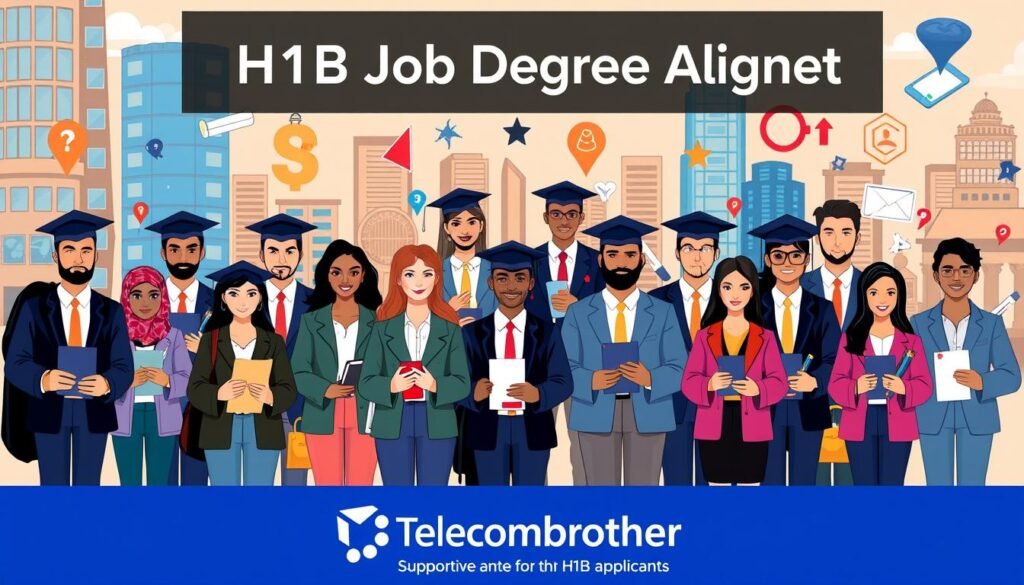Did you know that 79% of H1B RFEs are now approved? Crafting the perfect response is key to your visa application. It’s important to show how your job matches your degree.
An H1B RFE is not a denial. It’s a chance to give more evidence of your skills and education. USCIS wants more info to decide on your H1B visa.
The H1B visa application process is getting tougher. Approval rates have swung between 60% and 86% in recent years. A good response to an H1B RFE can greatly affect your career in the U.S.
You need to show that your job needs the skills you learned in school. This means you must provide clear evidence of a direct link between your degree and the job.
Key Takeaways
- H1B RFEs are requests for additional information, not automatic denials
- Approval rates for H1B visas have varied between 60% and 86%
- Detailed documentation is crucial for a successful RFE response
- Your job must require specialized knowledge matching your degree
- Timely and comprehensive responses increase chances of approval
Understanding the H1B RFE Process
Getting a Request for Evidence (RFE) for your H1B visa can be tough. An H1B RFE is a message from USCIS asking for more proof that you’re eligible for the visa. They want to make sure your job is a specialty occupation.
Defining the H1B RFE
An RFE is when USCIS says they need more info to decide on your H1B petition. They mainly check if your job is a specialty occupation. They also look at if there’s a clear employer-employee relationship.
Common Reasons for Receiving an H1B RFE
USCIS might send an RFE for a few main reasons:
- Not enough proof of specialty occupation
- Questions about the employer-employee relationship
- Job description is too vague
- There’s doubt about your qualifications
The key is to provide comprehensive documentation that clearly demonstrates your position meets specialty occupation standards.
In Fiscal Year 2018, the most common reason for H1B RFEs was the “Specialty Occupation” category. USCIS checks if your job really needs a specialized degree and advanced knowledge.
The chance of getting an RFE has gone up a lot lately. About 60% of H1B petitions got an RFE in 2019. So, it’s very important to prepare a strong initial application.
You usually have 60 days to answer an RFE. If you don’t give enough information, your petition could be denied. So, be careful and thorough in your response.
Importance of Demonstrating Job-Degree Alignment
Getting through an H1B RFE needs a smart plan to show your job fits your education. The USCIS checks if your education matches your job closely. This is key for H1B rules.

When facing an H1B RFE, show that your job needs the skills from your degree. About 60% of H1B petitions with a Request for Evidence get approved. This shows how important a strong answer is.
How to Showcase Your Qualifications
Your H1B skills should show how you add value to your job. Here are some ways to highlight your job-degree match:
- Link your academic training to your job duties with detailed documents
- Use industry standards to prove your job is specialized
- Show how your degree prepares you for specific tasks
Utilization of Job Descriptions
It’s vital to tell a strong story about your H1B job duties. The USCIS wants to see that your job needs special knowledge.
| Degree Requirement | Proof Strategy |
|---|---|
| Bachelor’s Degree Minimum | Detailed job description matching degree specialization |
| Specialized Knowledge | Expert letters confirming industry-specific requirements |
| Unique Role Responsibilities | Comprehensive documentation of specialized tasks |
“Your ability to articulate how your academic background directly applies to your professional role can make the difference in successfully responding to an H1B RFE.”
The main goal is to convincingly show that your job needs the skills from your education.
Crafting a Strong Response to an H1B RFE
Getting an H1B RFE can be scary, but it’s a chance to make your petition stronger. A good response can really help you get your visa approved.
When you’re making your H1B RFE response, getting ready is important. You want to clearly answer each question from USCIS with solid evidence.
Key Elements to Include in Your Response
- A detailed explanation of how your job qualifies as a specialty occupation
- Clear documentation linking your educational background to your current position
- Comprehensive evidence demonstrating your professional credentials
- Systematic addressing of specific concerns raised in the H1B RFE
Formatting Your H1B RFE Response
How you format your response is key. It should be:
- Organized and easy to follow
- Professionally written
- Backed up with clear, relevant documents
- Short but detailed
“A well-prepared H1B RFE response can turn a potential problem into a visa approval.”
Recent stats show good news. The number of H1B RFEs has dropped from 40.2% in FY 2019 to 9.8% in 2023. Also, approval rates after RFEs have stayed high, between 81% and 98%.
Your H1B RFE response is your chance to show USCIS you’re qualified. Be confident and pay close attention to the details.
Gathering Supporting Documentation

Dealing with an H1B RFE means you need to prepare well. Your application’s success depends on the evidence you gather. Knowing what to collect is key.
Critical Types of Evidence for H1B RFE
When you’re getting ready for your H1B RFE response, focus on strong evidence. This evidence should show you’re qualified for the job. Here are the must-haves:
- Academic transcripts that show your job relevance
- Job descriptions that meet specialty occupation needs
- Letters from your employer
- Correspondence from academic advisors
- Reports that prove your professional skills
Strategic Documentation Organization
Organizing your H1B RFE documents is important. You should arrange them in a way that makes sense. Each document should link your education to your job.
“Quality trumps quantity when responding to an H1B RFE” – USCIS Immigration Experts
Documentation Best Practices
For a good H1B RFE response, follow these tips:
- Put documents in order by date
- Use clear section dividers
- Include a detailed cover letter
- Use color-coded tabs to highlight important parts
- Make sure all non-English documents have certified translations
Your aim is to tell a story that shows you’re the best fit for the H1B Visa. Each document should support your skills and job fit.
Consulting Professionals for H1B RFE Assistance
Dealing with an H1B RFE can be tough and confusing. Getting help from experts is key when you face tough immigration rules. The details of an H1B Visa Request for Evidence need skilled advice to boost your approval chances.
When to Seek Expert Advice
You might need a pro’s help with an H1B RFE. Look for an immigration expert if:
- Your job needs special skills
- Your education doesn’t match your job
- You get a complex Request for Evidence
- Your H1B Visa application has big challenges
Selecting the Right Immigration Attorney
Finding the right immigration lawyer for your H1B RFE is important. Seek someone with a good track record in H1B Visa cases and USCIS rules.
“The right attorney can turn a tough RFE into a visa win.”
Look for these qualities:
- Experience in H1B immigration law
- Success with RFE responses
- Understanding of specialty occupations
- Knowledge of your field
An Expert Opinion Letter is key to show your role’s special nature. Good lawyers can make strong documents that meet USCIS needs well.
Final Tips for a Successful H1B RFE Experience
Handling an H1B RFE needs careful planning and attention to detail. Your response can greatly affect your visa approval. USCIS gives you 90 days to send in all the needed evidence. So, managing your time well is key to a successful H1B compliance strategy.
Importance of Timeliness in Submitting Evidence
Acting quickly is your strongest defense against an H1B RFE. Keep track of your deadlines closely. Missing them can ruin your H1B Visa application. Premium Processing can speed up the process, usually within 15 days, easing your worries.
Staying Informed About Immigration Policies
Keeping up with immigration laws is crucial for a smooth H1B RFE experience. Read immigration law blogs, join webinars, and talk to immigration lawyers. This way, you can prepare for any issues and make your H1B petition stronger.
An H1B RFE is a chance to show more about your qualifications. By staying organized, quick to respond, and informed, you can tackle the H1B visa process confidently. This will boost your chances of getting approved.